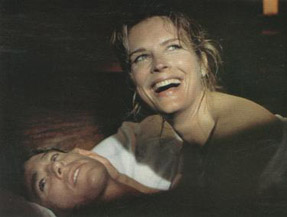Chapter Two:
Oliver's Story and Class of '44
By Brett Ballard-Beach
March 15, 2012
The opening scene, set during the high school graduation of Hermie, Oscy, and Benjy, is notable for what I take to be its straight-faced satire on American patriotic wartime jingoism, as what should be a straightforward and festive occasion becomes an ultra-serious and downbeat pep rally/military recruitment/religious revival. But whatever nuance or critique can be glimpsed there quickly evaporates. Any point to be made from then on (about the relative merits of college, the honor principle, heavy petting, pledging a frat, writing for the college paper, serving one’s country) becomes simply another poorly edited plot point that accumulates ad infinitum. The story lurches from incident to incident with little sense that these moments are meant to add up to any thing in particular. As an example: Benjy merits very little significant screen time on the second go round (and as I recall, he vanished fairly quickly from Summer of ’42 as well.) In all, he is allotted about three minutes total, not much more than an unbilled and nearly unrecognizable John Candy in his screen debut.
Hermie has a meet cute with Julie on his first day. She is a co-ed who is upper class (based strictly on what the screenplay tells us) and more than a little bipolar (based strictly on what I can observe from her behavior.) She and Hermie date after a fashion, break up after a fashion, and if the clichéd but confusing final scene is any indication, have backseat makeup sex after their own fashion. Oscy is once again around for sex-obsessed shits and giggles (his big subplot is pimping out a local hooker to the frat guys) before he finally grows up by the end and follows Benjy into the military. Jerry Houser’s performance here, as in the first film, is endearing, in spite of Oscy’s inherent unlikability. He is as raucous as Seann William Scott’s character in the American Pie films, but less of a douchebag, and mentally faster on his feet. I think of him as a Neil Simon alter ego that Simon never quite got around to penning.
The first of the film’s two key problems is the unacknowledged void at its center. Summer of ’42 has a void of its own: WWII. Yes, it is there, and it inadvertently leads to Hermie’s deflowering but because of the age of the trio, and their being on a relatively secluded vacation spot (and it must be said, Raucher’s artistic license), they seem to exist in a world where Pearl Harbor is barely a reference point, let alone six months in the past, where an offhand reference to an older brother in the military is only a fraudulent anecdote launched in order to secure a trio of condoms from the island druggist.
In Class of ’44, that void is: the summer of ’42. This life-altering event, even if you only go by the wizened remarks of the elder narrator, this summer that changed everything, is never acknowledged, not once. Not in Hermie’s demeanor, not in any off-color jokes from Oscy (which was where I was most anticipating it), not even in a “is this your first time” moment when he and Julie make love. There isn’t even any narration to solemnly intone the vagaries of the past. The only references to the earlier film were in the poster art and ad campaign (“They’ve done a lot of growing up since the Summer of ’42.”)
Continued:
1
2
3
4
5
|
|
|
|

![]() Tweet
Tweet
![]() Print this column
Print this column



